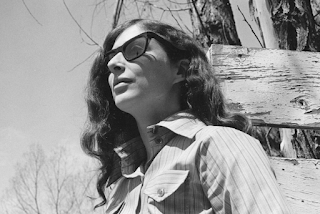The MC5 in print, 2024 edition
MC5: An Oral Biography of Rock’s Most Revolutionary Band isn't that book and it isn't Edmonds book, either. It is however culled from the mountain of interviews Edmonds did with former 5 members and associates. As such there's minimal commentary from the author(s), and no real discussion of their music, which I consider a loss. On the plus side there's a lot of interview material with Rob Tyner, probably the most interesting member of the band and one who's thoughts hadn't seen print much over the years.
Running at least neck-and-neck with Tyner is John Sinclair, activist and manager. Which I think is a mistake. Sinclair's of undeniable importance in the MC5 story, but he didn't write or play the music, and his political battles and legal hassles, while they provide important context to the 5's story, take up way more space in the book that could have been given over to more relevant material. Plus Sinclair has written his own books. The input from Wayne Kramer dovetails almost entirely with his own book, The Hard Way, which is well worth a read - but honestly pales next to his 90's interview with Addicted To Noise. Dennis Thompson and Michael Davis are both heard from but again, mostly a repeat of what was already shared in Brett Callwood's Sonically Speaking. Davis has his own book out there which I haven't read yet.
There's a plethora of information on the recording of Back in the USA, though mostly about producer Jon Landau's attempts to get his preferred sound out of them. But very little is said about their final, and best, album - High Five.
Since there's little here other than quotes, there is, as said, no real discussion of the music. How did these songs come be? What were they trying to accomplish? Who were their real influences - sure lots of artists are name-checked along the way, but which ones did the band ultimately find most shaped their own ideas about what they wanted to communicate, musically? None of that is here. No attempt is made to resolve the many contradictory elements in the MC5 story. Was having their first album be a live recording a good idea or a mistake? Does the resultant LP capture the audio essence of a live 5 show, or doesn't it? Was Back in the USA an ill-conceived, poorly-produced emasculation of the band, or a smart and needed move? Was Jon Landau a force for good, or ill? Was their association with Sinclair's political activism a good move, or did it cost them a wider audience (and if so, why were The Jefferson Airplane able to get away with being outspoken radicals? Or did they just have shrewder management?). All of these are laid out but none of them are discussed or resolved - we merely get the clashing opinions of various participants, none of which are even remotely objective, even at this distance.
I would like to have heard from the fans and people who were influenced by them, and those who saw them back in the day - not just in their native Detroit (we get a fair share of raves from those) but out there in the world when they tried to spread their gospel (Greil Marcus had less-than-great things to say about their show in Berkley, and in Boston they didn't exactly make friends with The Velvet Underground, though Sterling Morrison liked them). There is nothing at all about the post-5 lives and careers of the members, except for passing mentions in a wrap-up at the end. Considering all of them continued making music and none of them ever escaped the shadow of the 5, that's an omission.
Most glaring though is the omission of Fred "Sonic" Smith, who apparently provided no, or no usable, interview material to Edmonds during his life. Apparently there wasn't anything to work with, and nothing from his ex-wife nor his widow Patti Smith. Obviously that's a handicap, but the end result is Smith ends up a shadowy bit player in the story.
The 5, along with The Yardbirds, are the band I'd most like to see get treatment as given to others in the titles I mentioned above. So yeah, I was hoping for such and didn't get it, and as such must express some disappointment.
But is it a bad book simply for not being the book I'd like it to be? Hardly. In fact it's quite good, and the extensive insight into Rob Tyner is worth the read. Uhelszki and Tolinksi did, I think, the best they could with what they had. And that's good enough for now.



Comments
Post a Comment